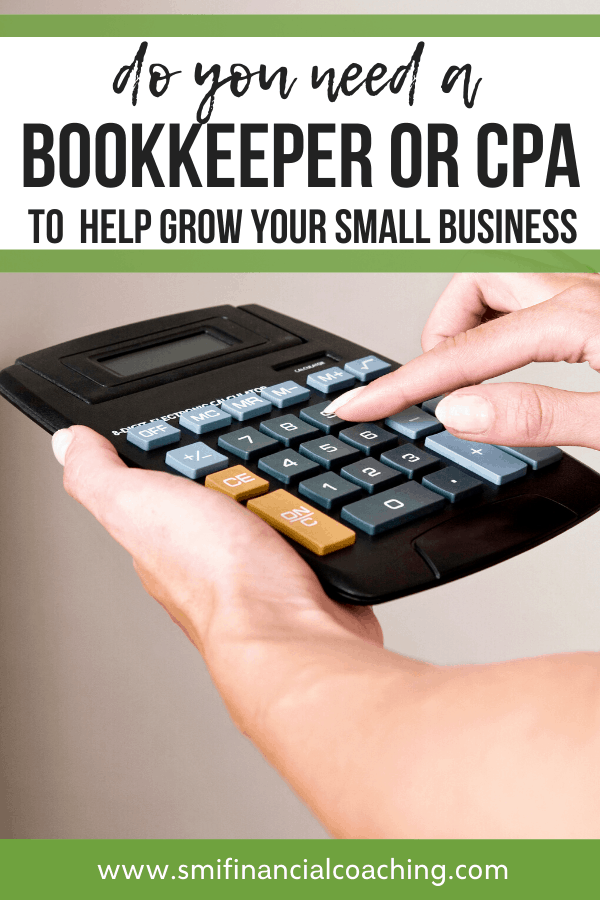When you own a small business, who do you hire to handle your finances? Learn whether to hire a bookkeeper or a certified public accountant (CPA) and what the difference is between them.
“I don’t want to deal with the finances. I would rather make more money and hire someone to do it for me.” Does that statement from Zach Arnold, a creative entrepreneur in California, sound familiar? Lots of small business owners feel the same way. When you are busy trying to balance the books and keep everything tracked and organized, you aren’t out there helping your business earn more money.
Hiring a professional accountant gives you more time to focus on your growing company. You won’t have to worry about maintaining your accounting software or who to hire to do your taxes.
This guide will explain the differences between a bookkeeper and a CPA and how to decide which one to hire. Then, I’ll explain why a financial coach is just as important. There are a few things even the most-qualified CPA won’t do as well as business or financial coach who is focused on helping you earn more money.

Bookkeeper or CPA – Which One Should You Hire?
First, let’s compare a qualified and experienced bookkeeper to a CPA. Which one is better for entrepreneurs?
When you need to hire someone to do the financial part of your business, should you hire a bookkeeper or a CPA? And what even is the difference?
There is a pretty huge difference between bookkeepers and CPA’s (Certified Public Accountants). Additionally, there’s also a difference between a CPA and a general accountant.
It’s important to understand the distinction so you can pick the one that will help your business grow the most.
Bookkeeper For Small Business – What They Do
First, let’s look at what a bookkeeper does for a small business. Most bookkeepers or accountants are not CPA’s – they don’t have that certified designation. Since CPAs have to be trained and maintain 40 hours of continuing education every year, they will always display their credentials. If your accountant isn’t a CPA, you will know.
The typical responsibilities of an accountant for a small business are:
- Manage cash flow
- Use bookkeeping software to input and track expenses and deposits
- Process vendors’ invoices
- Bill and follow up on accounts receivable
- Process payroll
- Reconcile account balances
In other words, they keep track of where your money is going and keeping it all organized.
What Is A CPA?

CPAs, however, have a lot more education and training behind them. Most states won’t let people take the CPA licensing exam unless they have a bachelor’s degree first.
The biggest difference between a CPA and a bookkeeper/accountant is training and education. Because of this, CPAs will cost more to employ, but the difference is usually small and worth it. They can do everything a bookkeeper does, including tracking expenses and processing payroll. But they can do so much more than that as well, including representing your business to the IRS and handling all tax matters.
They also have to have continuing education every year for 40 hours per year to stay certified and updated on new tax laws (timing and hours vary by state). That means they will always have the most current knowledge about tax laws and how that applies to your small business.
It’s important to note that a CPA is different from an accountant. An accountant is someone who works on financial records. A CPA is an accountant that has passed state certifications.
Which Accountant For Small Business To Hire
I personally suggest everyone hire a CPA to do all your bookkeeping and financial matters. Since they have extra training and education, they know more about the current tax laws. They will be able to handle all your taxes better than an untrained accountant. That alone is worth it. Tax laws are constantly changing for small business owners. You need to hire someone that will know how to maximize your tax-deductible expenses and minimize how much you pay.
What A CPA Won’t Do For Your Small Business
There are so many things a CPA can do for your business, and you definitely need one if you don’t enjoy tracking your own income, expenses, and handling your taxes. But there are a few very important things a CPA won’t do.
While they are excellent at tracking everything and handling your taxes, they won’t necessarily tell you how to do things better. They might give you some excellent advice about places you can spend less, but if you want a detailed plan for accomplishing financial goals with your business, you should hire a financial coach.
CPA’s are not trained to look at your P&L reports and tell you what to do differently to make your business more profitable. They are specialized in taxes, not pricing, profitability, and business operations to see where you could be saving money or making more money. This is what a financial coach would do.
You Need a Financial/Business Coach

In addition to a qualified CPA, you need to invest in a financial or business coach too. They will dig deep into your finances and create a plan tailored just for you to help you meet your goals.
A financial coach will point out places and costs that you can cut to save you money. They will also show you how to use this money in the smartest way.
Have you ever wondered if a new business investment like an expensive piece of equipment is a good idea? Or have you ever wondered how to make the smartest purchasing decisions so that you can afford to pay yourself more?
These are all questions that a financial coach can answer.
There are a ton of benefits of hiring a financial coach. In addition to helping you set goals, they will keep you accountable and do all they can to help you meet those goals.
Hiring a financial coach will also save you a ton of time. Sure you can try to look at your P&Ls, set your own goals, and keep yourself accountable, but it will take a lot longer. And as an entrepreneur, you know that time really is money!
Bookkeeper or CPA
So many entrepreneurs and small business owners hire someone to handle their finances so they can focus on marketing and big ideas, overseeing the growth of their company. When you are ready to hire one, a CPA is your smartest option. They maintain continuing education so they always know the current tax laws.
Before you hire one, check their credentials and read reviews. The best CPAs will have excellent communication skills, able to explain the taxes to you. They will also be reliable, never falling behind on your books.
SMI Financial Coaching
Contact me today for a complimentary consultation. I’d love to chat directly with you and hear all about your growing business, your dreams for it, and how we can work together to help it grow. If you have never hired a financial coach before, please reach out with any questions you have about it. This will be the best thing you could ever do for yourself!
Related Post
If you enjoyed this post about hiring a bookkeeper or CPA, then you will also enjoy learning about the difference between a financial coach and a financial advisor. Yes, there are differences, even if they aren’t obvious.
